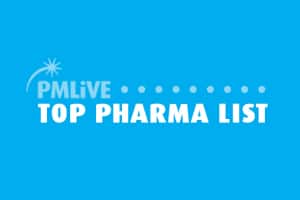 Roche, Johnson & Johnson and Amgen rose up the rankings of the PMLiVE Top Pharma List in 2013, while Bristol-Myers Squibb, Merck & Co and Sanofi lost ground.
Roche, Johnson & Johnson and Amgen rose up the rankings of the PMLiVE Top Pharma List in 2013, while Bristol-Myers Squibb, Merck & Co and Sanofi lost ground.
The exclusive industry ranking is centred around global pharmaceutical sales (including generics) for the 25 largest companies in the industry and based on figures provided by GlobalData.
The 2013 ranking, which was updated this week, showed Roche leapfrogged Merck & Co. and Sanofi to become number three in the pharma rankings.
This was largely thanks to significant turnover declines at the latter two companies resulting from patent losses, according to Joshua Owide, GlobaData’s director of healthcare industry dynamics.
Meanwhile, Roche enjoyed a solid year of growth thanks large to a strong performance by its oncology portfolio, including both established therapies such as Avastin (bevacizumab) and MabThera/Rituxan (rituximab), as well as emerging therapies such as breast cancer therapies Perjeta (pertuzumab) and Kadcyla (trastuzumab emtansine).
Johnson & Johnson also had a very strong year in pharma sales, with eight of its key products, including anticoagulant Xarelto (rivaroxaban), Zytiga (abiraterone) for prostate cancer, arthritis drug Stelara (ustekinumab) and antipsychotic Invega Sustenna/Xeplion (paliperidone) driving collective sales growth of more than $3.5bn.
In contrast, the impact of ageing products eroded less than $900m from J&J’s prescription pharmaceutical business, which helped the company put in the biggest growth spurt of all the 15 companies.
Like Roche, another major biologic drug producer – Amgen – enjoyed considerable growth in 2013, also jumping a couple of places in the rankings. The US biotech saw increased sales from its two biggest selling franchises, Enbrel (etanercept) and Neulasta (pegfilgrastim), while also building on the early success of osteoporosis therapy Prolia (denosumab) , sold as Xgeva for bone metastases.
The acquisition of Onyx towards the end of 2013 also had a minor effect on Amgen’s top-line over the latter stages of the year.
In contrast, Bristol-Myers Squibb, overtaken by Amgen, continued to suffer from the fallout of the Plavix (clopidogrel) patent expiration, which alone cost it more than $2.2bn in sales.
The company also faced declines for antipsychotic Abilify (aripiprazole) and irbesartan-based Avapro/Avalide for high blood pressure and growth of BMS’ oncology and autoimmune disorder products could do little to remedy these drops.
“The principal challenge facing all major drug manufacturers is the ability to replenish revenues eroded from maturing brands suffering the effects of generic erosion with newer, innovative therapies,” said Owide.
“Some companies have proven to be more defensive than others, notably those involved in the production of biologic medicines, such as Roche and Amgen,” he added.
As a result, companies such as Merck & Co and BMS are now placing significant emphasis on emerging biologic medicines, in an attempt to mirror the success of Roche and its Genentech subsidiary.




